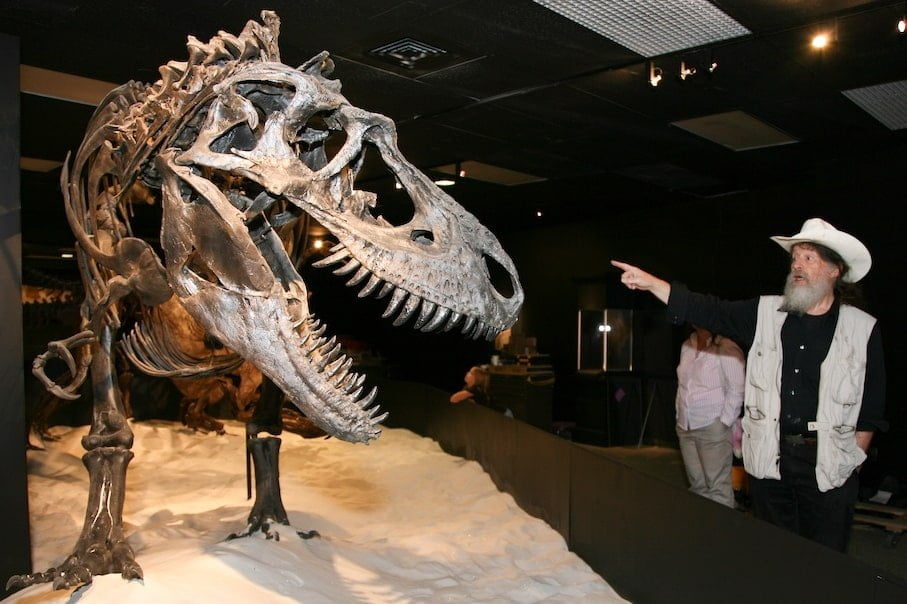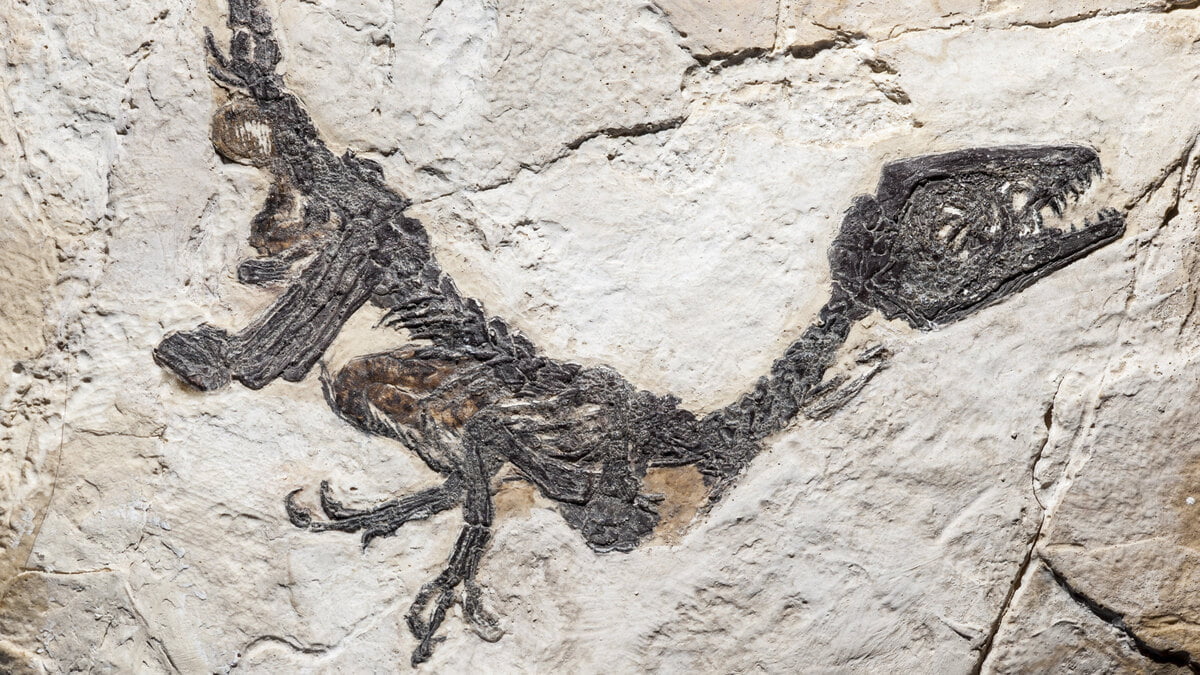Are you looking for a rewarding career exploring ancient life? You are among the millions of people who are interested in paleontology careers.
A fascination with extinct life often begins in childhood. Unfortunately, that fascination tends to fade over time. This could be due to the high barriers to entry including low salaries and limited job opportunities for paleontologists.
It’s essential to understand the basic requirements of becoming a paleontologist as you weigh multiple career paths. There’s a lot more to paleontology jobs than simply hunting for fossils.
Paleontology combines several different branches of math and science into one field. The outlook for paleontology careers remains uncertain when considering similar career paths.
People tend to grow out of the childhood phase of big dreams. They ultimately settle for more stable careers. While no one can argue the practical concerns associated with some jobs, the fact remains that we need people willing to pursue their passions.
Sciences that advance medical knowledge, war powers, or that offer large commercial value, command a vast amount of funding. Who pays to find dinosaurs?
Well, not many do. Thus, paleontologists are expected to attain a high level of foundational knowledge to operate under limited budgets in the completion of highly specialized work. What exactly do you need to know?
The Paleontologist Job Description
A paleontologist is a scientist who studies prehistoric life. The field relies on studying fossil remains that preserve details about various life forms and their place within ancient ecosystems. It combines elements of various fields of science, most notably, biology and geology.
The job of paleontology is often confused with archeology, a similar field that studies human activity and culture. If you’re interested in archaeology, check out our other article that covers the relationship between archaeology and paleontology.
Specializations Within Paleontology
Paleobotany: the study of plant fossils throughout geological time. Along with other disciplines, paleobotanists reconstruct materials to identify trends in plant evolution and environmental change over time.
Micropaleontology: the study of microfossils, the fossils that require a microscope to analyze. Micropaleontology provides information into the microorganisms that exist in an environment to render data for climate science, evolution, and even archeological research.
Paleoecology: the study of ecosystems reconstructed from the study of various lifeforms found in a geological system. The investigative approach taken provides insight into the stability of ecosystems and the interaction between organisms.
Paleoclimatology: the study of climates before the advent of human measurements. Studying past environments affords insight into current trends and the impact of existing ecosystems.
Paleobiogeography: the study of the geographical dispersion of living things. By studying the shifts in the earth’s crust scientists can identify speciation across the globe.

These are just a few of the sub-disciplines of paleontology. As you begin to advance in your college studies you can narrow down your niche.
Educational Requirements for a Paleontologist
Starting early is the best way to meet the educational requirements of a paleontologist. Young children can develop skills in reading and a passion for science. As a parent, you should provide ample resources on paleontology from dinosaur books to age-appropriate general science books.
Stress the importance of research and expose them to as many academically challenging programs as possible. Science fairs are one opportunity to build a solid understanding of the scientific method in a competitive environment. We have an article on paleontology science fair projects that can provide some ideas.
High school students have the chance to excel in science and math classes that will broaden their understanding of key topics. While everyone understands the need for some of the primary science topics, math can become overlooked. Nearly all degrees in science demand solid math skills.
Tips for Academic Success
A well-rounded education is key. Students should pursue as many of the following subjects as possible:
- Biology
- Geology
- Physics
- Chemistry
- Calculus
- Statistics
Paleontologists in most countries will need a college education to pursue a full-time job in the field. While many universities have excellent programs, success in high school often affords better college prospects.
Not all programs are of equal rigor; likewise, not all provide the same quality of professors or amount of research opportunities. Although individual achievement and networking matter more than your university of choice, potential employers may favor some programs over others.
Do not become discouraged if you get rejected by your top choices. Again, while university prestige matters, your body of work matters far more in determining success. Many do well at one university and transfer.
A student should list potential universities in his or her junior year and begin the application process. A good way to narrow down prospects is by asking current students about the programs offered.
See if a current student or professor will act as a mentor and provide advice. The best way to learn about anything is to ask questions.
Suggested Reading for Aspiring Paleontologists
Aspiring paleontologists may find the following books beneficial to growing a solid understanding of the field. We suggest readers pick up Peter Larson’s book, Bones Rock!: Everything You Need to Know to Be a Paleontologist.
Many reviews praise the book for being a solid middle-ground between books for children and college-level texts.
The author, Peter Larson, is a prominent paleontologist who is best known for his work on Sue the T. rex. His perspective on paleontology makes the field interesting and provides a compelling case for why paleontology is so important. The included teacher’s guide makes it perfect for the classroom bookshelf.
College Degree Requirements for Paleontology
Once you’ve received a diploma, many years of work remain. You might wonder, what are the degree requirements for a paleontologist? There are no paleontology degrees in the United States.
A bachelor of science degree in a topical scientific discipline is the best educational path to take. Many students major in either Geology or Biology and take paleontology courses within these majors.
A master’s degree is a typical requirement for most paleontology jobs. Many obtain a Ph.D. or a doctoral degree to become professors. Some might be required to lead independent research programs.
You may ask, what are the top universities to study paleontology? The answer is a bit tricky.
If you are looking for paleontology degree programs, the Paleontological Society website lists various options across the world. The site provides websites and contact information for each program. I highly recommend saving this resource.
Do not become distracted by vague ranking lists for top colleges. These are often paid for by colleges and rarely offer any good advice. The best choice is one that suits the personalized goals of the student.
Choosing a Course of Study
Coursework choices can be tailored to suit student interests and academic advisors can suggest customized programs. Interestingly, you’ll never know how specific courses may benefit your career interests.
For instance, a foreign language minor could help when conducting research abroad. Don’t become overwhelmed and take courses because of what others tend to choose. Know yourself and structure your coursework to maximize your current skills while shoring up your weaknesses.
There will be numerous research paper requirements, often culminating in a dissertation that must be defended. This scrutiny ensures that students face a rigorous test to perfect their skills as researchers.
Graduates acquire a broad set of skills that prepare them to think critically and to demand the highest standards of their colleagues in the scientific discipline. Expect to spend around six to eight years after high school to acquire the education necessary to become a paleontologist.
Gaining Experience as a Paleontologist
While a stout educational background will help you land that first job, do not neglect the benefit of experience. Students need to take part in internships, volunteer programs, or tailored research programs while completing their coursework.
This will provide useful social contacts through networking that may provide a means to employment. Indeed, even the most qualified individuals may lose opportunities unless they manage to get a foot in the door.
Contact museums in your area and find out if there are any events that you can attend to gain experience. You could give tours, teach children, or assist in fossil preparation. Universities often require student internships and will partner students with professors to conduct research.
Amateur fossil hunting can significantly advance your career by providing field experience to recognize good locations. We have an in-depth guide to fossil hunting for beginners. This hobby can help people to determine if they want to pursue it further.

If you’d like to take your fossil-collecting hobby to the next level, you can learn fossil preparation techniques. We have an article that covers how to clean fossils at home, which covers using tools such as a Dremel to extract fossils.
Additionally, the hands-on experience will enhance the knowledge garnered in the classroom and teach many intangible skills. If you have artistic ability, you can showcase your drawings to build a personal brand.
In an earlier post, we detailed how profound dinosaur media becomes in shaping public perception. Your art, whether sketches, video productions, or even blogs can help educate the public and establish yourself as an authority in the community.
Once again, your networking can help you make the right contacts for personal advancement. You have an opportunity to get help from others while giving back to the community.
Hard work and strong determination are the most important traits of anyone aspiring to be a paleontologist. Though the educational requirements for paleontology seem daunting, many find solace in a deep-seated desire for discovery.
Through a mix of education and experience, you can position yourself as a highly desirable candidate. Now, where do you look for work?
The Paleontologist Job Outlook
So what is the job outlook for a paleontologist? The truth is that this data remains unclear, but the Bureau of Labor Statistics groups paleontologists with other geoscientists on their website.
The data provide some misleading figures, as working for the petroleum industry is far more lucrative than working for public universities or nonprofits.
How much money do paleontologists make? The salary range falls somewhere between volunteer work to more than $100,000 per year depending on your credentials, location, and the nature of the work.
Be wary of sources that fail to address the shortcomings of job data. These may offer a far more prestigious outlook than is realistic.
Individuals with specialized education will always have something to offer. This, however, becomes limited by the scope of the employer. Once again, paleontology does not command the same attention as many other fields in terms of financial resources, so you will settle for less than your optimal salary potential.
Job growth remains fairly stagnant with slight growth in demand for many specialized scientific fields remaining closely tied to funding. We have another article if you’re interested in learning more about the impact of paleontology on other scientific fields.
I would advise against using these statistics as a basis to determine a profession. Become a paleontologist because that is who you are inside.
Just be aware that financial uncertainty is the norm and that you may need to utilize your education in other ways should opportunities become scarce.
Finding Work as a Paleontologist
Where do paleontologists work? The vast majority of paleontologists find jobs as university professors teaching science courses. These professors conduct research and publish their work in journals. They also may participate in field expeditions during the summer.
Some find work within museums providing education or preparing fossils. These jobs tend to be fewer in number and lower paying than university positions. Still, the best way to qualify for better jobs is through relevant experience.
As previously noted, funding concerns remain a challenge. Jobs at museums provide an experience that can build a solid background for candidates seeking academic careers. If you are not sure of a specific niche for you, the following section will provide an overview of some options.
Paleontologist Benjamin Burger’s Guide to Careers in Paleontology
Paleontologist Benjamin Burger has some very useful videos on the topic of jobs in paleontology. We have consulted paleontologists and used some of their feedback in this article. Burger’s overview provides his expertise in the field as a professor. Burger’s website offers more detail on the subject.
Are Paleontology Careers Right for Me?
We cannot answer this question for you. Those who want to become paleontologists do so because of a genuine passion for the field. A job in paleontology may not be for everyone, but for those who commit to the profession, the prospect of making discoveries that have an impact on the field is gratifying.
The competition for jobs may increase. This is due to the growing popularity of the field. However, there are upsides here as well. Increased public awareness of paleontology and new avenues of funding can provide more resources.
Creating a public that values the work of paleontology can improve the ability of researchers to pursue new methods of research. We may have given you a dismal outlook on becoming a paleontologist. Still, we do encourage you to pursue your passion.
Some things in life require us to put aside our preconceived notions and go with our guts. Your success is not guaranteed in any career path, but with enough perseverance, you can reach your goals.
Our world needs more scientists to perform this valuable work. We must inform aspiring paleontologists about what challenges exist. With this information, they may decide how to move forward.
If you are up for the challenge, there may be a wealth of opportunities awaiting you. A career in paleontology just might be the best thing for you.
You can leave us a comment if you have additional suggestions. We would love to learn how to improve this guide moving forward. If you find this content useful, please share it with your friends.



I am actually earning a bachelor’s in Paleontology at Montana State University. I believe a school in North Dakota also offers paleontology as a bachelor.
That’s interesting. At the time of writing this, I didn’t realize that there were specific bachelor programs. I’ll definitely include that when I revise the article. Thanks for letting us know!
Good article. I am a BSc Geology student who adores Palaeozoic life
Thank you! We are working on an update to the article soon to expand it. If you have any further ideas you’d be a great resource for the topic.
As the parent of a 4 year old actively engaged in dinosaurs and paleontology led by Dinosaur Train and Dino Dana, this article is fairly well researched and very helpful but would benefit from additional research. My understanding is that employment opportunities in mining and drilling also exist as such businesses often accidentally uncover fossils and require assistance with preservation and removal. Also, like many human endeavors, Western countries lead in paleontology and fossil preservation so fossils discovered in less developed countries often are used to attract tourism or enhance prestige which often means government sponsored research led by Westerners that respect the local culture and speak the local language. If one develops basic movie production skills and is willing to present findings in a manner that flatters sponsors, acknowledges efforts of native talent and ties effort to Western achievements, one is opening future doors for additional opportunities. It would be nice if these additional areas were addressed.
This is an excellent comment! I did not consider those aspects when writing this originally. I will be sure to delve into those topics soon as I go through updating the article. The commercial aspect of fossil collecting is another topic we may cover in a separate piece too.